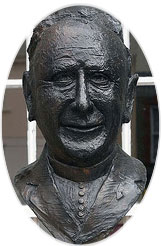 “We will be judged not by our plans and aspirations but by what we have performed and carried to fruition.”
“We will be judged not by our plans and aspirations but by what we have performed and carried to fruition.”
An Anniversary Mass for the late Very Rev Canon John Hayes (1887–1957), founder of Muintir na Tíre, will be celebrated in Bansha Parish Church on Friday February 7th next at 7.30pm. Canon Hayes was Parish Priest of Bansha/Kilmoyler Co Tipperary from April 1946 until his death. This Mass will mark the 57th Anniversary of his death.
History of Rev Canon John Hayes
Muintir Na Tíre was founded by Canon Hayes in 1937.
From its conception the three main and ever abiding aims of this organisation were: (A) The spirit of self-help; (B) The cultivation of community spirit; (C) The basic ideal of a unit of thought and understanding for the life of each rural parish. Included in these basic principle or ideals for Muintir Na Tire was that it should be based on the acceptance that all sections of society were equal and display at all times a spirit of complete neighbourliness within each community.
Canon John Hayes was born in a land league hut at Murroe, Co Limerick on November 11th, 1887. Five of Canon Hayes’s brothers and sisters had died before he himself had reached the tender age of seven years, these deaths caused by squalid living conditions. Canon John, a practical joker with a great sense of humour, was initially educated at the Jesuit College in Limerick and at the age of seventeen he began his studies for the priesthood here in St. Patrick’s College, Cathedral Street, Thurles. In 1907 he attended the Irish College in Paris and was finally ordained in 1913. In 1915 he was sent to Liverpool,England to minister, later moving back to became Chaplain to the Mercy nuns in Templemore, Thurles, Co. Tipperary.
In 1925 he was moved to Ballybricken, a rather remote parish in east Limerick where he set up a branch of the Pioneers Total Abstinence Association (PTAA) in the adjoining parish. His own parish refused to support his PTAA efforts. In 1927 he was moved to Castleiney, Thurles, Co Tipperary and here his PTAA efforts were again accepted.
These early community experiences taught Canon Hayes that an organisation was very much needed to demonstrate strong leadership, which would support rural country folk. Then British Rule had down through the years, particularly following the Great Famine (1845-49), been systematic in the destruction of organised rural community life through past centralised systems of administration, (Minister Phil Hogan take note lest history repeat itself.).
Father Hayes, ignoring centralised Dublin administration, now sought to mould rural people together and so began his attempts to construct and identify possible rural industry and pressurise these same controlling centralised systems of administration.
These now attempts by him at identifying rural industry initially were aimed at the Angora Rabbit Scheme, in particular providing fur for the lining of jackets used by aeroplane crews. During WW2 thousands of jobs were created providing turf. Tobacco and Rhubarb growing became small but profitable industries. To these same ends educational lectures and ‘Rural Weeks’ were organised. There were many successes and as in so many such ventures some failure also, however rural communities began once more to have a faith and confidence in themselves and Muintir na Tire came to be allied quickly with this growing progressiveness.
Parish meetings were often held in freezing school classrooms using only the light of a ‘spitting’ candle. Representatives were chosen and sent to Dublin to obtain telephone kiosks for remote rural parishes and to demand better rural water schemes. New ‘Community Halls’ began to spring up and necessary repairs to almost derelict local schoolhouses began to be implemented in every small village and hamlet.
The biggest achievement for Muintir na Tíre however was possibly the implementation of Ireland’s rural electrification scheme, began in the early 1950’s. Latter was the process of bringing electrical power to the rural, impoverished and remote areas of Ireland.
Note: All Muintir na Tíre units and members, together with the public are welcome & invited to attend this special Mass in Bansha Parish Church on Friday February 7th next at 7.30pm.

Leave a Reply